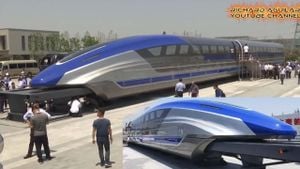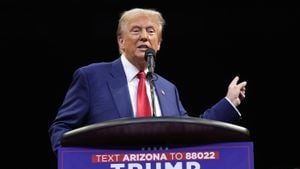Japan has recently faced significant political and economic turmoil, as the ruling party has lost its majority following scandals and soaring inflation. Prime Minister Fumio Kishida admitted the results of the latest snap election were "tough," reflecting growing public dissatisfaction with his administration's handling of these issues.
The backdrop to these political changes is the alarming rise of inflation rates within Japan. After years of stagnation, Japan now grapples with the highest inflation levels seen since the early 1980s, driven largely by the global fallout of economic events like the pandemic and rising energy costs. This surge has hit consumers hard, leading to higher prices on everyday goods, including food and fuel, which has tested the loyalty of the electorate.
Inflation hasn’t only impacted household budgets but has also contributed to declining public support for Kishida's Liberal Democratic Party (LDP). Significant price hikes have made it increasingly difficult for the average citizen to manage their finances, and the government’s efforts to provide relief have been met with skepticism. Critics argue the measures taken have been inadequate, insufficiently addressing the core issues behind these economic pressures.
The recent snap election was viewed as Kishida's gamble to secure more stable support for his policies, especially as discontent simmered beneath the surface. Losing the majority has prompted painful questions about the direction Kishida’s leadership will take moving forward and who might be poised to take his place.
Interestingly, the situation mirrors wider economic trends seen globally, as other nations are also experiencing high inflation. The struggle against rising prices has become common and problematic across the world, exacerbated by factors such as supply chain disruptions, energy shortages, and geopolitical tensions.
Meanwhile, the opposition has begun to capitalize on these sentiments, pushing for more immediate and direct action to combat inflation. Political analysts suggest this could signal significant shifts within the political fabric of Japan, should the opposition manage to consolidate their gains against the LDP.
Economists are now closely watching the aftermath of these elections, with questions about how Kishida will navigate the political waters and whether his government can alleviate the burden on Japanese households. There are concerns about potential delays or failures to redirect economic policies to effectively control inflation, which could lead to more severe public backlash.
Public opinion polls have shown declining approval ratings for Kishida, with many citizens vocalizing their frustration over rising costs and lack of progressive solutions from the government. A growing number of voters seem ready for change, possibly throwing support behind new political figures who promise to address these economic woes more aggressively.
While Kishida’s government faces significant challenges, the outcome of these elections opens doors for reform and potential realignment within Japanese politics. The people of Japan are not only assessing economic stability but are also responding to the question of leadership as they navigate uncertain times.
This situation also has global ramifications. The world's economy continues to grapple with the repercussions of inflation, and how Japan handles its economic policies might influence international markets and relationships moving forward. The actions taken by the Kishida administration could either bolster efforts to stabilize the region or contribute to wider economic challenges depending on their effectiveness.
Over the coming weeks, analysts will be focused on Kishida's next steps, his government's initiatives to address inflation, and how these measures will be perceived by both the public and the political sphere across Japan.
For now, the nation waits to see whether there will be substantial changes and if the government's ability to manage the economy can earn back the trust of its citizens.



